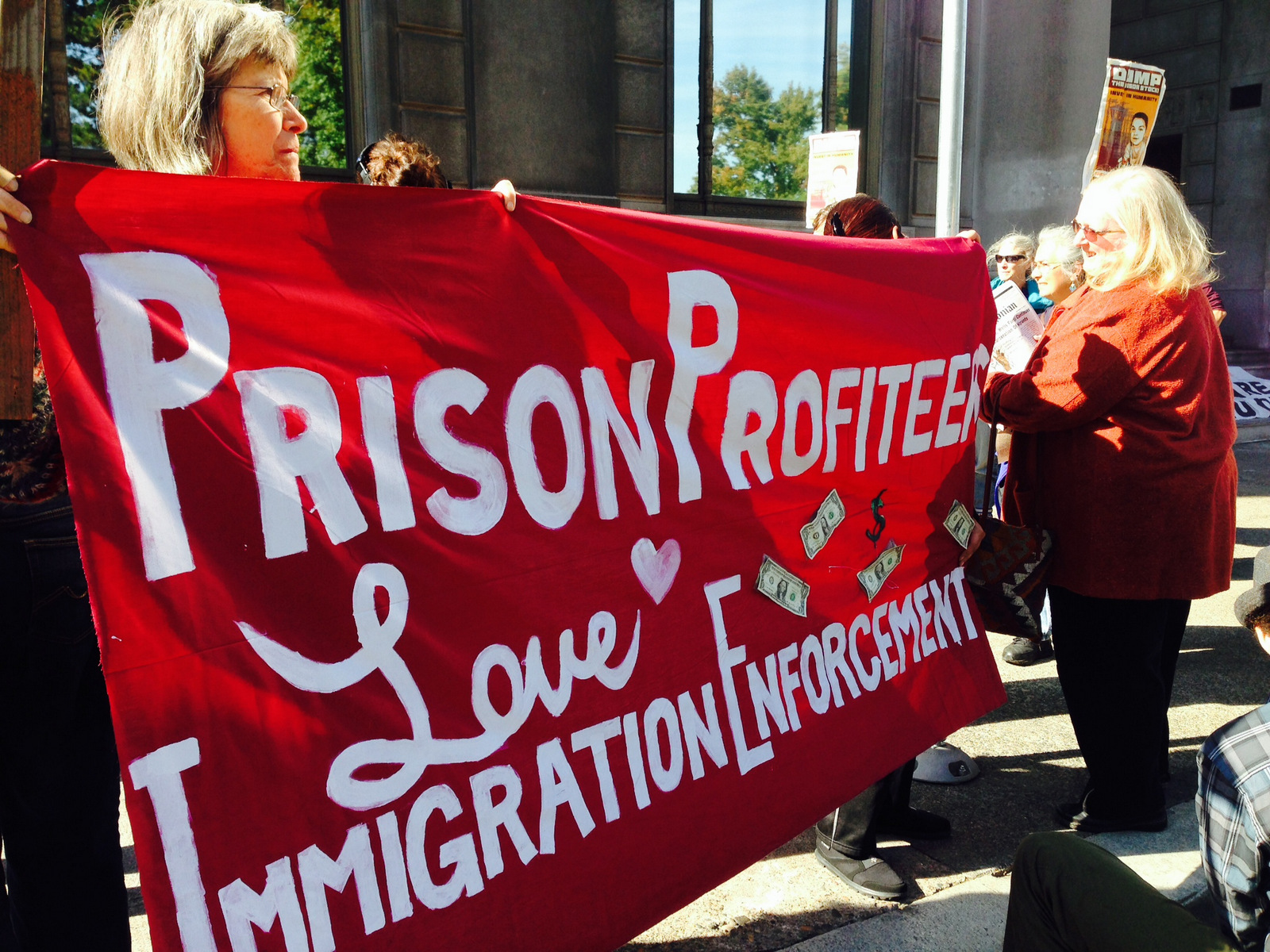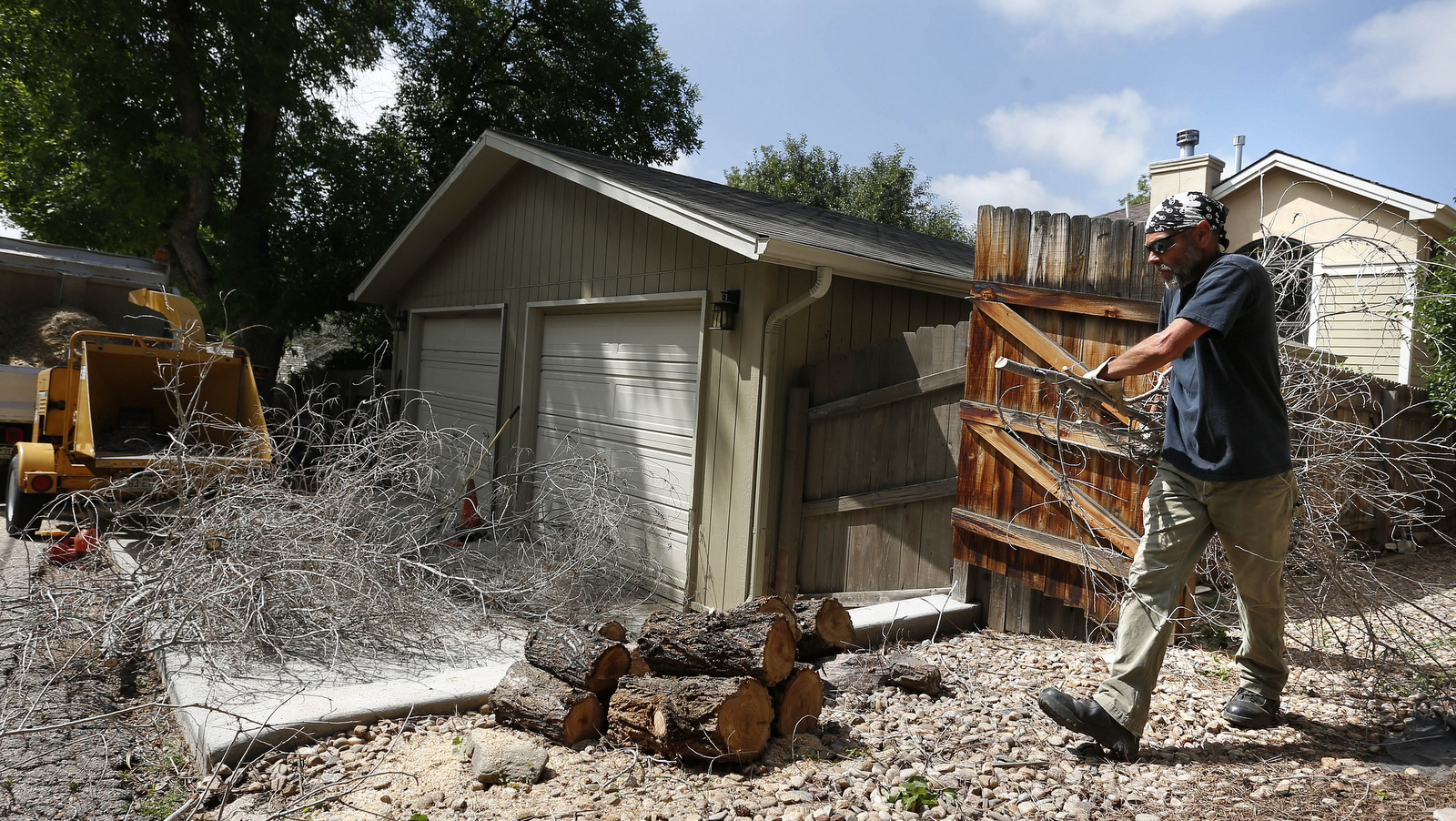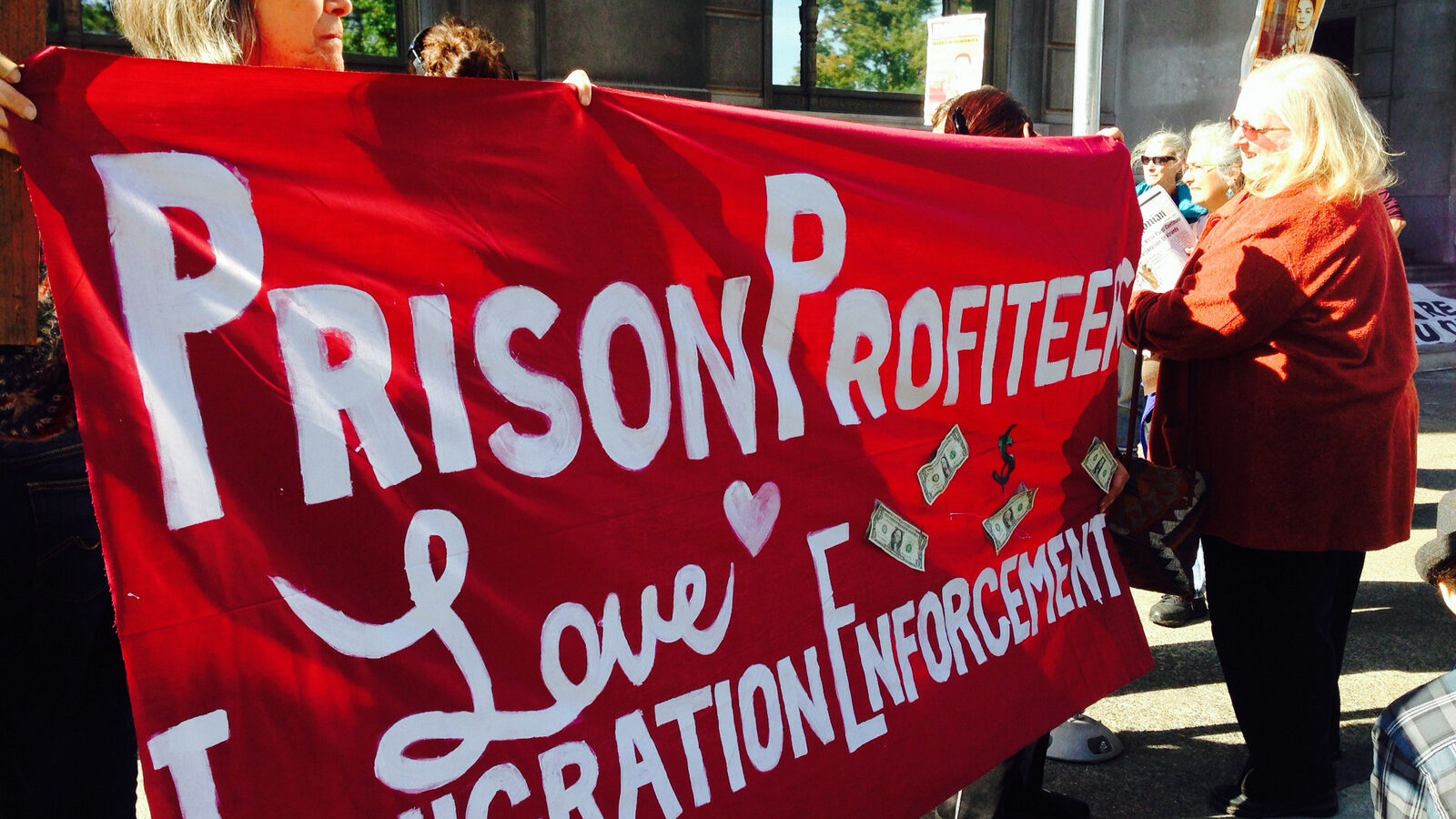
Published in partnership with Shadowproof.
In March, District Court Judge John Kane granted class action certification to a lawsuit challenging slave labor practices at a private immigrant detention center in Aurora, Colorado, operated by GEO Group, Inc.
The decision, in the case known as Menocal v GEO Group, drastically increases the lawsuit’s potential implications. It will enable between 50,000-60,000 people formerly incarcerated at the GEO Group facility to seek remedy for their forced labor.
A favorable judgement or settlement from an anti-slavery class action lawsuit would be a major victory for these formerly incarcerated people and a serious financial setback for GEO Group.
Brought under anti-slavery provisions of the Trafficking Victims Protection Act (TVPA), the lawsuit could also be used as a basic template for other litigation challenging incarcerated slave labor. Such labor is a common feature of immigrant, juvenile, pretrial, state, and federal incarceration in the United States.
This is the first time a private prison contractor has been sued for violating the TVPA. However, it is unclear whether the TVPA can be used to challenge inmate labor in other pretrial settings or in prisons. Clearly, for prisoners with convictions, the “exception clause” to 13th Amendment to the Constitution presents a daunting obstacle.
The TVPA And The 13th Amendment
The forced labor provision of the TVPA makes it “unlawful for anyone to knowingly provide (or obtain) the labor or services of a person… (1) by means of force, threats of force, physical restraint, or threats of physical restraint to that person or another person.”
The TVPA states the labor or services of a person cannot be obtained “by means of any scheme, plan, or pattern intended to cause the person to believe that, if the person did not perform such labor or services, that the person or another person would suffer serious harm or physical restraint”
The lawsuit claims GEO Group forced detainees to work for $1 per day or less doing housekeeping and participating in a “Voluntary Work Program.” But the courts were not convinced by GEO Group’s arguments that this labor is voluntary because detainees are threatened with solitary confinement if they refuse to work. Attorneys for the former detainees argue this arrangement violates the TVPA.
Court documents show detainees were made to strip and wax floors, clean bathrooms, assist in the catering of GEO Group-sponsored law enforcement events, and landscape the grounds of the GEO Group facility, along with a variety of other jobs.
The lawsuit contends GEO Group “unjustly enriched” itself, paying detainees next-to-nothing for jobs that could have gone to prevailing wage employees. This exploited labor increased GEO Group’s profit margins.
Such labor conditions are not exclusive to private immigrant detention centers, but exist in public and private jails and prisons across the country as well. Last year, a national prison strike against slave labor was called by incarcerated people across the country in an attempt to undermine the system through massive work-stoppages.
Members of Jailhouse Lawyers Speak (JLS), a group of incarcerated human rights advocates and prison abolitionists, addressed the difficulty of challenging incarcerated slave labor in court.
“On a state level, we’ve had comrades in the past, from Jalil Muntaqim to a host of other comrades, who have filed lawsuits to challenge the 13th Amendment,” said James, a member of JLS who was granted anonymity to avoid retaliation. “But it was not very successful simply because they were already convicted of a crime.”
James is referring to what many call the “exception clause” of the 13th Amendment to the constitution, which reads, “Neither slavery nor involuntary servitude, except as a punishment for crime whereof the party shall have been duly convicted, shall exist within the United States, or any place subject to their jurisdiction.”
Court opinions, including Ruffin V. Commonwealth, Draper V. Rhay, Lindsey V. Leavy, and Blass v. Weigel, have upheld that the enslavement or involuntary servitude of individuals who have been convicted of a crime is not a violation of the 13th Amendment.
“I think that this is the first time that [forced labor or slavery] has been challenged from this particular angle here,” James said, referring to the TVPA. “I applaud the attorneys that are working on this.”
“We are hoping on our end, that it definitely opens up the door for other challenges.”
Challenging Pretrial Immigrant Slave Labor

GEO Group’s attorneys argue the lawsuit could set the stage for challenging labor policies in other private facilities. They believe the judge’s decision to certify the lawsuit as a class action will ultimately force them to settle the case, because the liability will represent too significant of a financial risk.
“GEO is the sole defendant here. But its financial and legal position is dictated by its contracts with the federal government,” a GEO Group attorney told the court. “These contracts were drafted on the assumption that the sanitation policy and daily VWP (Volunteer Work Program) allowance would continue to be effective — a reasonable assumption given that both policies have withstood legal scrutiny for decades.”
There is a body of law around pretrial detention that provides for what is known as a “housekeeping exception,” enabling jail operators to utilize uncompensated inmate labor to keep the facility running.
But Andrew Free, an immigration and civil rights attorney working on behalf of the plaintiffs, argues the TVPA “makes no distinction in the text about who qualifies as a trafficker, or person who obtains labor, through force or threats of force.”
“And it makes no distinction about the types of folks who can be trafficked or, in other words, people who could be forced to work,” Free says.
GEO Group also said the court’s “novel certification” poses a “potentially catastrophic risk” for the company, as a “skeleton of this suit could potentially be re-filed against privately operated facilities across the United States.” The contractor is concerned private prison companies will be forced to defend these lawsuits, even though they firmly believe the plaintiffs have no legal claim.
They acknowledge detention facilities run by the United States government, as well as those operated by other contractors like CoreCivic, also force detainees to perform labor for little-to-no money under the threat of solitary confinement.
“GEO’s status as a government contractor puts it in the position of having to answer for what are essentially grievances against Congressional and DHS/ICE policies,” the attorneys conclude, “and to face substantial claims for monetary relief that it will be unlikely able to settle.”
While it is true that Immigration and Customs Enforcement (ICE) has a Housekeeping and Voluntary Work Program policy, it does not call for solitary confinement or any other punishment if detainees refuse to work. It is this threat of punishment that is being tested by the TVPA.
“Federal private prison contractors are not above the law,” Free said. “They sign a contract with the federal government that requires them to abide by federal, state, and local law. And when they violate it in the course of executing that contract, they’re still liable.”
The private prison company wants a three-judge panel from the Tenth Circuit to stop the class action from moving forward before a final decision is rendered in the case.
The Need To Challenge Incarcerated Slave Labor Elsewhere
There are examples, like McGarry v Pallito, where individuals have sued and won cases against the state for certain types of forced labor while awaiting trial. However, the 13th Amendment has failed to prohibit the enslavement of people with a criminal conviction.
Bennu Hannibal Ra-Sun of the Free Alabama Movement, an organization of incarcerated people that called for the 2016 prison strike against prison slavery, notes the conditions that motivated the lawsuit are not limited to private immigrant detention centers.
“Anywhere where you see a building where people are incarcerated, those people are doing prison slave labor, because that’s the only way the jobs can get done,” he said. “That’s the only way the institution can function. And they’re bringing that point up about the ICE detention facilities, well that applies to county jails.”
“So, that means you could go and find the same class action lawsuit at all the county jails around the country, because those guys are pretrial detainees waiting to go to trial too, and they’re being required to work.”
Although certain types of unpaid labor may violate the rights of pretrial detainees, individual lawsuits don’t seem to deter the abuses of the state or private contractors. Most pretrial detainees are in detention because they cannot afford bail, let alone the legal fees to sue the state for their labor conditions.
Attorney Andrew Free argues class certification is crucial for reform efforts because it “empowers otherwise marginalized and susceptible detainees through group action to hold the corporation accountable for the way that it has made these profits.”
Free said that if people were forced to fight these cases individually, “not only would they be subject to the potential for retaliation or the potential for costly litigation against these billion dollar entities, but they also wouldn’t have a real shot at changing the way the entity does business.”
According to the ACLU, private prisons held approximately 7% of state prisoners and 18% of federal prisoners in 2015, but as of 2016, they held nearly 75% of federal immigration detainees. However, activists argue private prison companies play a broad role in shaping policy and legislation with regards to incarceration.
“With private prisons you have to remember, they fund the legislation to fill up the state prisons and they’re sitting there waiting for the overflow to pour out,” Bennu Hannibal Ra-Sun said.
“These private prison companies are human traffickers, that’s the only way that you can look at it, because that’s what it is. These people are invested in human trafficking,” he said.
Ra-Sun describes companies like GEO Group as “market evaluators,” adding “they look at the immigration issue and they say ‘okay, if we lobby for tougher immigration laws and then we lobby for more red tape and bureaucracy to get these people to immigration facilities and then we can hold them there long enough, this is the potential profit that we can make.’”
He was one of the prisoners who called for the nationwide prison strike in September 2016, reaffirmed his belief in the power of work stoppages as a form of resistance.
“If all of those guys and all of those women were to stop doing anything, if they didn’t do any kind of work again, ever, how much would it cost to the GEO Group to bring in cooks, cleaners, preparers, and would they still be able to profit off it? If they would still be able to profit off of it, they don’t care.”
Sunday from Jailhouse Lawyers Speak also believes the struggle for better labor conditions among the incarcerated is the same, regardless of whether they’re immigrants, pretrial detainees, or incarcerated due to criminal conviction.
“The situation doesn’t need to be separated because our situation, the federal situation, and the private-owned prison situation is all the same.”


